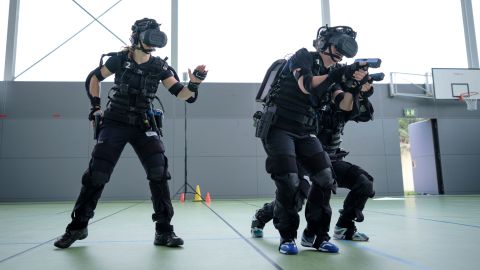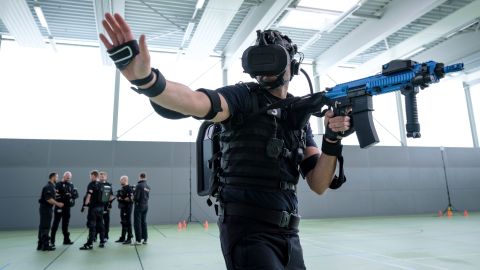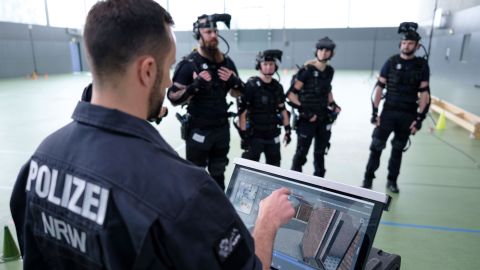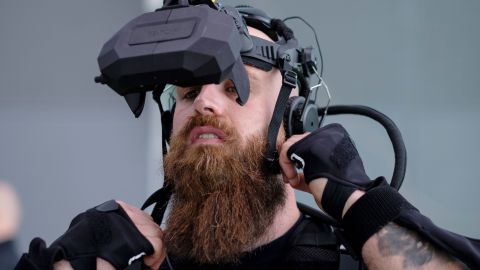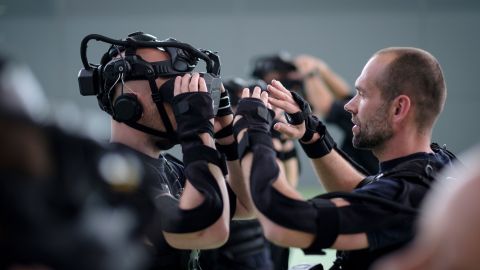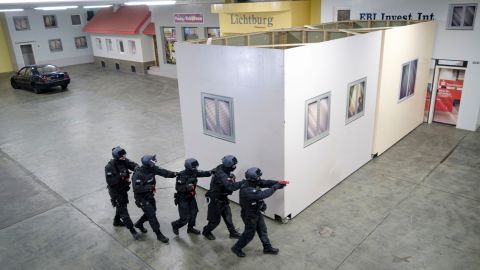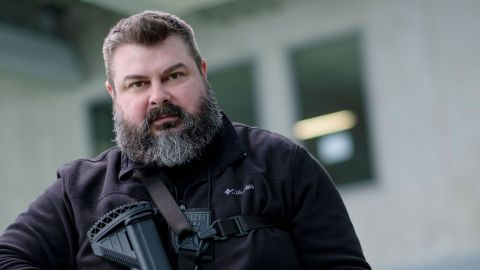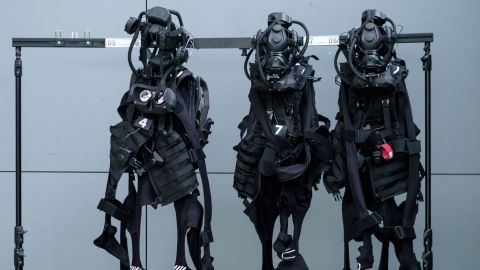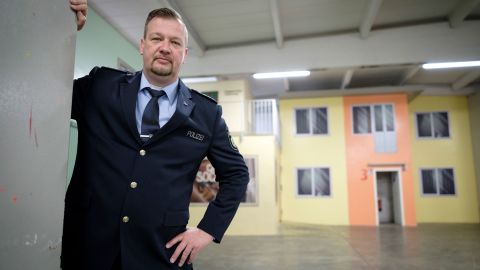The instruction is played directly to the ears. "Attack in a furniture store." All available forces are alerted. Several unknown persons have opened fire on customers and staff. A team of four prepares for the operation. One last check: the belt with the weapons is fastened. The bulletproof plate carriers are tight against the body. A belt below the chest measures the heart rate variability (HRV) - i.e. the stress level. Backpacks with computers hang on the backs of the men and women. From now on, they will record all their actions. Let's go, the black-uniformed quartet dives into an interactive world in real time. Sven Galant, the operations trainer in charge, checks once again whether the VR goggles attached to the helmets fit properly. VR stands for virtual reality. The police officers move carefully with their firearms drawn. The squad covers 360 degrees. Violence can come from any direction. Just don't make a mistake. The task for the team is to practice correct behavior in extreme danger at different stress levels.
We are in a gymnasium at the Landesamt für Ausbildung, Fortbildung und Personalangelegenheiten der Polizei NRW (LAFP NRW) in Selm.
Over the course of two days, three dozen operational trainers from North Rhine-Westphalia are trained in a new method that represents a quantum leap in police training and further training. The VR exercise is part of the EU project SHOTPROS, which runs until November. The results will then be evaluated. In addition to NRW and Berlin, police authorities in the Netherlands, Belgium, Sweden and Romania are also taking part. Several European universities are providing scientific support for the project.
The project is investigating how stress affects the ability to act. The aim of the project is a standardized expansion of European police training using VR technology to improve decision-making in high-risk situations in particular. Brussels has made 5.6 million euros available to the partners in the individual countries for this purpose. For the NRW police, participation in the project also serves to gain experience with the use of VR in basic and advanced training.
The technology platform was developed by the company RE-liON from Enschede, which has been cooperating with the Dutch police for a long time. The scenario, in which fiction and reality are combined, runs on a large monitor at the edge of the training hall. Every step is registered and embedded in virtual reality. On the screen, the participants look like actors in a comic drama: digitally animated and dramatic.
When you stuck your head through the door, the perpetrator could clearly see you.
Sven Galant
For the police officers, however, everything feels totally realistic. Experts call this immersion. The VR goggles catapult the participants into a dramatic event. The training group is now completely in their movie and creeps up a back staircase. A digitized role-player suddenly intervenes and shouts: "What are you doing here?" An escalation seems imminent. The intervention forces are waiting at the bottom of a landing. The perpetrators have apparently entrenched themselves on the adjacent floor. The tension is palpable, even for observers.
After a brief hesitation, the head of the training group leans forward a little. On the sports field, this is just a tiny turn of the body. In virtual reality, he is hit immediately. More shots are fired. "Don't move or I'll shoot," someone shouts excitedly into the hall. Another falls to his knees. Then it's over for now. The training session is over.
We want to strengthen the strengths and weaken the weaknesses.
Ines Fiebig
"First of all, you kept your guard up consistently," said Chief Superintendent Sven Galant from the LAFP training team, praising the initial approach in the debriefing. He normally works as an operational trainer at Bochum police headquarters. Now he turns his attention to the person who became a victim in the exercise. "When you stuck your head through the door, the perpetrator could clearly see you." He didn't notice him straight away, the victim replies apologetically. The VR glasses had slipped.
In any case, it was a shock. The training makes it clear that even a small mistake can be fatal. Galant's colleague Ines Fiebig considers the VR training to be an ideal addition to the real-life training that everyone has already experienced during their training. The police chief inspector, who is actually an operational trainer at the Lippe district police authority, sees VR training as the future. It is no longer possible to cheat. "If you've been hit, you've been hit."
In fact, the "after-action review" system is incorruptible. Ines Fiebig sees this as a great opportunity. It allows everyone to check their behavior again and then correct it. "Whether you stood well or could have used the space better, all of this becomes very clear."
This allows you to learn faster and practise more. "The desired confidence in the action is then consolidated through repetition. In an emergency, this makes you more stress-resistant," explains the 35-year-old. No one should leave the training with a bad feeling. "We want to strengthen the strengths and weaken the weaknesses," summarizes Ines Fiebig. In exceptional situations, self-confident police officers are clearly better able to protect people under threat and themselves than others who are gripped by fear.
"We are only at the beginning," explains psychologist Ortwin Maetzing. "But in five years' time, what we're doing here will be commonplace." The LAFP NRW research associate for professional leadership and training sees enormous potential for the use of virtual reality. "Studies have shown that the learning effect is greater when stress increases. However, this does not mean that we should immediately head for the red level." In fact, it often makes sense to reduce the stress level again. "If you panic, you won't learn anything. Learning effect before wow effect is the motto."
Communication is very important. This can often defuse a tricky operational situation. "We want to train police officers who are aware of their responsibility. But also act consistently when necessary."
The EU project SHOTPROS involves the Free University of Amsterdam, Heidelberg University, the Catholic University of Leuven and the Austrian Institute of Technology (AIT). "We are working on making the scenarios even more realistic," says Jakob Uhl from Munich, who conducts research at the AIT in Vienna and traveled to Westphalia for the field study to take a close look at the training processes. "Ultimately, we want to focus on the needs of the users."
Much can still be integrated into the VR processes. "For example, you could give the test subjects a pulse of pain with a short electric shock when they have been hit," reports Uhl. This would feel something like an insect bite. This would increase the threatening nature of the situation. "We have also developed a process with which unpleasant odors - faeces, smoke or petrol - can be fed into the processes."
However, this does not mean that we immediately switch to red.
Ortwin Maetzing
"We are still experimenting," comments Alexander Schäfer. He is the coordinator for the EU-SHOTPROS project at LAFP NRW. "We want to create good stress for optimized training," says the police chief inspector. "We are not ego shooters who play shooting games for fun." The sole aim is to improve training and further education. "There are strict rules. Shots must never be fired without reason."
The 48-year-old Dortmund native emphasizes that police officers must not lose their natural inhibitions when using a weapon. It is very pleasing that everyone has proven themselves in the VR scenarios so far and has acted responsibly. No bystander has been hit by a police officer. "We can see this today in the training of the extremely fit operational trainers and experienced the same thing a few months ago with members of a hundred-strong squad." Alexander Schäfer sees this as evidence of the generally good level of training. "We have to keep a cool head and yet remain capable of action," he defines the overarching goal.
On the extensive LAFP site, we now travel with the Chief Superintendent to an existing, regular training building. It was upgraded a few years ago after the Islamist terror in Paris. The former Bundeswehr loading station now looks like a large, scenic shopping center with a cinema, stores and pubs. Police officers from the Bochum police department are currently training with regular color-coded weapons in strict compliance with safety precautions.
"The problem is that you can't really physically replicate operations in a large crowd," explains Alexander Schäfer. That would require countless role-players. "It's hardly feasible, extremely time-consuming and very expensive." Nevertheless, direct physical action and direct contact remain an essential part of training and further education. Real training should be supplemented, but not replaced. "With VR, you always create something new and can incorporate current events. This prevents dulling through habituation," summarizes the LAFP project coordinator. Even small authorities could stage large-scale situations.
By the end of the project in November, international experts will have formulated a set of didactic rules. Alexander Schäfer and Ortwin Maetzing from LAFP NRW have been asked to contribute. "Some things," says Schäfer, "we have obviously already done right." The experience gained as part of the EU project is very valuable, according to the Ministry of the Interior. "We are continuing to follow the EU project with great interest!" summarizes Tom Nissing from the NRW Police Training and Further Education Department.
